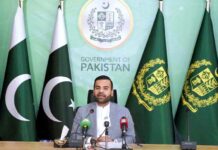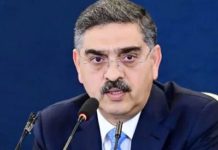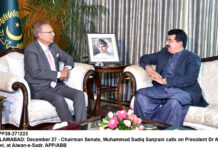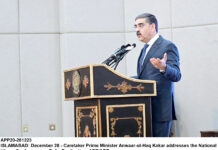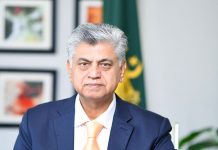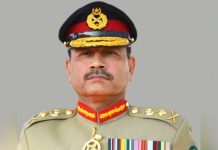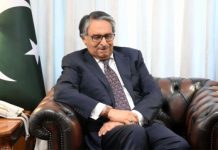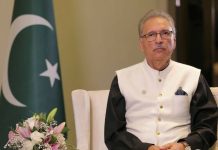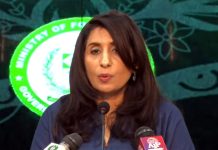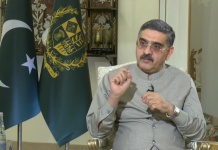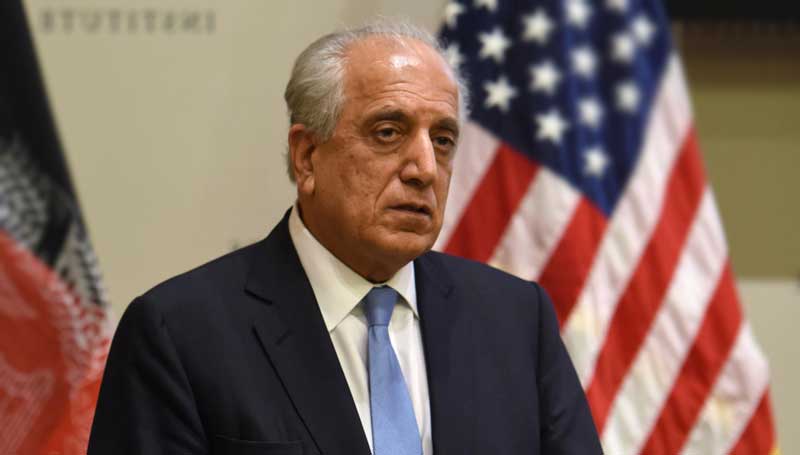
A high-level consultative meeting between Pakistan and the United States took place at the Foreign Office (FO), with the US delegation led by Ambassador Zalmay Khalilzad, Radio Pakistan reported.
The Pakistani delegation was led by Ministry of Foreign Affairs (MOFA) Additional Secretary Aftab Khokhar. The two sides discussed issues of mutual interest, including bilateral ties, regional peace situation and the Afghan peace process.
The Pakistani delegation also advised that all sides should focus on achieving a political resolution to the Afghanistan conflict.
According to a press statement issued by the US Department of State, the special envoy would travel to Afghanistan, Belgium, Germany, Pakistan, Qatar, and the United Arab Emirates from May 31 to June 16, 2019.
In Pakistan, Khalilzad is also scheduled to hold meetings with the country’s civilian and military leadership to discuss progress achieved in the Afghan peace process.
“He will work to build international support for the Afghan peace process… And endeavour to ensure that any peace settlement reached will be sustainable,” the statement read.
Khalilzad will continue talks with the Taliban in Doha, Qatar. “In Kabul, Special Representative Khalilzad will consult with the Afghan government and other Afghans, including representatives of civil society and women’s rights groups, to encourage all parties to work towards intra-Afghan negotiations that lead to a final peace settlement.”
Prior to his arrival, Khalilzad hailed the meeting between Prime Minister Imran Khan and Afghan President Ashraf Ghani on the sidelines of the OIC summit in Makkah.
In a tweet, he said the meeting would “improve relations between the two countries and help to implement and capitalise opportunities for regional connectivity, integration and development”.
Earlier, he took to Twitter to announce his latest tour and said there had been “substantial progress over the last month”. “After two weeks in Washington, I’m back on the road. We’ve made substantial progress over the last month,” he shared. “On this trip, I want to take that momentum and accelerate the Afghan peace process.”
Khalilzad said he was specifically focusing on integrating regional and international support for peace and would try to bring the “first two parts of our peace framework” to closure. “We are moving forward. I am optimistic. Success will require other parties to show flexibility.”
Meanwhile, Khalilzad reacted to Taliban leader Mullah Hibatullah Akhundzada’s statement and said it provided “some welcome support for the Afghan process”.
“The Taliban leader’s Eid statement provides some welcome support for the Afghan peace process,” he said in a Twitter post.
He believed that the statement also reflected the group’s desire to participate in dialogue with other Afghans and in a final political settlement that would require power sharing. However, he said that at the same time, the statement’s “bombastic tone” was unnecessary, which “only serves to complicate and disrupt as we advance peace talks”.
Furthermore, he said the statement suggested that the US sought violence. “We do not. The level of violence in Afghanistan is unacceptable and we have no desire to perpetuate it,” he said.
The US envoy is on a mission to expedite the Afghan peace process, as war in the country enters its 19th year. He has held a series of meetings with the Pakistani leadership as part of Washington’s renewed push to bring the Afghan Taliban to the negotiating table.
The latest push for peace came after President Donald Trump wrote a letter to Prime Minister Imran Khan, seeking Pakistan’s help for the negotiated settlement of the Afghan conflict.
Although both the US and Pakistan now have a commonality of views on seeking a political solution to the Afghan problem, the trust deficit between the two is the real stumbling block. Relations between the two countries are tense despite recent efforts to reset the troubled ties. At the heart of their stalemate is the US insistence on Pakistan to do more to bring the Afghan Taliban to the negotiating table. Washington still believes that Islamabad holds considerable sway over the group.

